- Home
- Keith Douglass
The Art of War c-17
The Art of War c-17 Read online
The Art of War
( Carrier - 17 )
Keith Douglass
When an extremist faction of Iranian militants takes the first bloody step towards toppling the decadent West, Admiral "Tombstone" Magruder and Carrier Battle Group Fourteen are the only ones who can stop the madmen cold.
Keith Douglass
The Art of War
Acknowledgments
Special thanks to freelance writer and naval aviation analyst Brad Elward for his assistance with the air combat scenes. Brad writes regularly for Combat Aircraft magazine and World Air Power Journal and his book, The McDonnell Douglas A-4 Skyhawk, published by Crowood Press, was released in July 2000.
ONE
The Iranian Desert, just east of the Iraqi border
Monday, August 10
1900 local (GMT +3)
Heat blistered up through the soles of his worn boots, seeped through two layers of socks, and drenched his feet in salty sweat. Ali ben Wadi could feel his feet baking in their own juices under the desert sun. The rest of his body was parched and broiled. The fine sand crept into every opening, sifting through clothes, clogging his nose, mouth, and eyes with gritty pain.
For all the discomfort, he reveled in the feelings, letting the pain and physical challenge wash over him like a cooling bath. Hell on earth it might be to some, but it was his hell, his home. As hostile as the desert climate was, it was a familiar inferno, one that he had grown up knowing and come to respect.
In contrast, the climate of the northeastern part of the United States would never be familiar, no matter how many years he spent in it. Four years at Harvard for his undergraduate degree, another two for a master’s degree, and then the final six months starting his doctorate degree, and every second of the time he’d longed for the harsh reality of his desert home.
Yes, it had been a sacrifice, but one he’d undertaken willingly. His government asked him to go, asked him to apply himself as best he could to knowing the ways of the United States, soaking up the knowledge, making contacts and learning to pass as a native — and then to return home, bringing with him his knowledge like a motherlode more precious than the oil beneath his feet. Over the last several decades of conflict and a return to traditional ways, there was one lesson that Iran had learned the hard way — to take advantage of what was offered by the incredibly naïve United States.
Wadi was considered a rarity in some circles. This experiment had been tried too many times with weaker men — never women, always men. Few women of any character or ability would have shamed themselves by choosing to live in such a decadent, sinful society, as evidenced by the fact that so few chose to return to their homeland after a taste of the American lifestyle. Even the men, his brothers and cousins born to this hard land had succumbed, whining from a distance about being allowed to remain in the West, advancing flaccid arguments about how they could better serve their people by remaining on station inside the Western world and insinuating themselves into the fabric of the culture as spies and subversive elements. Wadi had listened to their whining and vowed never to be the same.
A memory cropped up, seductive and enticing. The smell of Boston streets after a rain, the first scents of spring curling through the still-chilly air. He pushed it away, determined to divest himself of those weaknesses. To have enjoyed it while there was simply a matter of acculturation, of better coming to understand the weak and foolish people that made up that land. To reflect on it now, with hot sand under his boots and hard sun beating down on his shoulders was simply indulgence.
No, not indulgence, because that implied that there was anything at all pleasant about the experience. No, it was weakness, a sin of pride, and one that must be routed out at all costs. There was too much to do in the weeks and months ahead, too much at risk. He would not allow the petty temptations of physical comfort to distract him from his destiny.
His cousin, Jemal Hassan, turned to him. “Here, do you think?”
Wadi surveyed the area. To a Westerner, one patch of desert looked like the next. Flat, hot, sand — what more was there to understand about the country?
But to Wadi and Hassan, there was a richness to the subtlety of this land. There were prevailing winds to consider, the patterns of sand accumulation, the probability of a sandstorm whipping through and transforming this landscape overnight from hard-baked clay and sand into an ever-shifting dunescape.
“Yes.” Wadi made an impatient gesture. “The council has already approved it. This is merely a formality and a final chance to detect any problems.”
“Even so. I would wonder that we are so far from the ocean.” Hassan shifted a bit, as though a trickle of sweat was coursing down inside his traditional garb. Wadi allowed himself a moment of self-satisfaction. So long away from this land, and yet he tolerated it better than his weaker cousin.
“Irrelevant. We could be practically on the eastern border and still have the plan work.” The reaction times were so short on the scale that the Americans understood that a few minutes here or there made no difference.
“Yes, but—”
“Have you any valid points to offer?”
Hassan fell silent, but Wadi could feel his seething frustration. Not everyone had welcomed him back to Iran with open arms. His return had rearranged power structures and alliances that had grown in his absence, the way water flows in to fill a void, and the process of reestablishing his position within the family was still going on.
“I thought not.” Wadi hammered the point home, allowing a few moments for his cousin to feel his disdain. “Then we are done here.”
They walked back to the military vehicle in silence, each preoccupied with his own thoughts. For Wadi’s part, he was pleased with the encounter.
A few days to allow their report — his report, since he would ensure that his cousin’s name appeared nowhere on it — to circulate, and then the construction would begin. The foreign crews were already standing by, along with their equipment. It was a pain working with them, but few Iranians were willing to soil their hands with physical labor. If the riches that flowed from the black oil underfoot had one drawback, it was that easy wealth seemed to have eroded the willingness to work to survive that had characterized his people before.
Or was that a faulty perception, one that he’d picked up in the West? Yes, that was it. The wealth now allowed his people to take their natural place in Allah’s great plan, leading this part of the world into a return to traditional values, to following his sacred commands. It was not that his people were lazy or unwilling, it was simply that greater matters occupied them now. A man could not be expected to spend his days in hard physical labor when he had his leadership responsibilities to the rest of the world to consider. Let the lesser races take their appropriate place, working to redeem themselves from their sinful ways, sweating out their evil for the good of Iran. Yes, they died. Died from heatstroke, from snakebite, from what they complained of as poor nutrition and sanitation. Yet were these not the very conditions that had tempered the Iranian spirit, fired them into the proud and indomitable people that they were now? The days of toadying to American interests were gone, the interest of the oil companies nationalized, and Iran was moving steadily toward her proper role in the world.
Within a few weeks, this would no longer be empty desert. Concrete and tarmac would bloom like flowers after a rain. Metal would fill the skies, hard and clean under the sun. And eventually…
“Vengeance,” he whispered. “Vengeance will be ours.”
The slight coolness of early evening, if it could be called such, was welcome.
Just forty miles to the north, the hulks waited on the desert to answer his call. The low humidity was an excellent factor in their pres
ervation, and although the avionics and weaponry were outdated, money could cure that. Money could cure so many ills in the world, when properly applied. It was distasteful to have to deal with the foreign curs who had such expertise, and the prices that they gouged from this holy mission were an evil unto themselves, but all would be repaid eventually. The aircraft would fly again, harder, faster, and into danger’s path, piloted by the brave Iranian pilots that had been trained by the very people that they would soon challenge in the skies.
The impunity with which foreigners dared to fly in the airspace, proclaiming their right to keep the peace, even daring to shoot down Arab aircraft over their own soil — well, it would end, and it would end in a way that would show the rest of the world that this part of the world would never again accept such intrusions. Weren’t they the civilizations that had given birth to the rest of the world? The cradle of civilization, the very beginnings of mankind? And how far the rest of the world had strayed to turn their weapons on their own fathers and mothers.
Well, no more. Wadi and his people would prove the point, as they had so far. Fashioning together a coalition among the fractious nations of this world had been a difficult, delicate process. There were egos to consider, the different aims of the Shiite and Sunni cultures, the will of the ayatollahs, the guidance provided by Allah. And, like it or not, there were other cultures to consider. India, China — thank Allah that the Soviet Union now lay like a rotting corpse to the north, decades from ever interfering again.
The compromises within his own extended family had been minor compared to the necessity of providing each nation with that which they could not resist. In the end, it had been a matter of focusing them on what they had in common rather than the slight differences — heretical though they were — that divided them. Above all, each had an abiding hatred of the impunity with which foreign nations dominated their skies.
Nine months — long enough for a child to be born but barely enough time for the devout to nurture the seeds of a reborn nation. So long, the waiting, but the centuries of peace that would follow would make it seem but a blink of an eye. And he, Wadi, would be known forever as the father of the new Iran.
TWO
USS Jefferson
The Straits of Hormuz
Monday, May 3
2200 local (GMT +3)
The non-skid coating of the flight deck still held the heat from the day, but for the sailors accustomed to the blazing heat, even the slightest drop in temperature was a welcome relief. The slight breeze even more so — wind chill was a phrase that would never be applied to the searing heat in this part of the world, but air moving was cooler than air standing in thick, cloying masses around them.
It was slightly cooler inside the two F-14D Tomcats pulling alert-five on the bow catapults, but not by much. Yellow huffers were attached to each aircraft by an umbilical, powering the jets to provide air-conditioning, but the hot sun baking down through the shaded canopies still raised the interior temperature to unholy levels.
The Tomcats were fueled to full capacity, and carried two auxiliary tanks as well. The current loadout was two AIM-9M Sidewinders, two AIM-7M Sparrows, two AIM-54C Phoenix, a flexible, all-ranges antiair loadout. While the Tomcat was also a capable land-attack platform, there were no over-ground attack missions planned for the foreseeable future. Configured as a “Bombcat,” the aircraft could carry more ordnance further than its lighter Hornet brethren.
“I’m too senior to pull alert five,” Lieutenant Commander Curt “Bird Dog” Robinson said from the forward seat of Tomcat 106. He was complaining over the ICS — interior communications system — to his RIO, Lieutenant Harmon “Music” David.
“Yes, sir,” Music answered. “I agree completely. Far too senior.”
Bird Dog sighed. They’d had a rash of nuggets arrive in the squadron all at one time, and Music was part of that gaggle. Nice kid, wore glasses — what else could you say about a new RIO? And he seemed to have the proper respect for pilots, which was something you didn’t find often enough, in Bird Dog’s humble opinion, in the nonflying part of a cockpit crew. Yeah, that was a bit of a relief, especially after about a million years of being paired up with Gator.
Bird Dog’s thoughts drifted away from the cockpit and back to the past missions he’d flown with Gator. He knew what the admiral and the squadron thought about the team — there’d been too many times that Gator had threatened to punch out if Bird Dog didn’t go along with his decisions. The rest of the Navy seemed to think that this was a good thing, putting a killjoy in the cockpit with an experienced pilot who was more than capable of making tactical decision on his own, thank you very much.
Why, when they’d been up in the Arctic, what would have happened if he’d listened to Gator? The Russians would have fried a whole SEAL squad, and who would have said boo to Gator about that? Bird Dog had punched his way through the landscape to put ordnance on target at precisely the right moment and saved the day. All over Gator’s objections. Well, Bird Dog bet he could roust up a couple of SEALs who were more than happy that someone had the balls to—
“Sir?” Music’s voice broke in on his reverie.
“What?”
“Nothing, sir. Just wanted to make sure you were okay.”
Shit. Like he’d be the first pilot to catch a few winks in a hot cockpit on alert-five. Yeah, he was definitely too senior to be pulling alert-five.
But with nuggets, what were you going to do? You had to pair them with someone that had some experience, that’d managed to prove themselves in more than one combat arena. Bird Dog conveniently ignored the fact that that was exactly why he’d been paired with Gator.
So because BUPERS, the Bureau of Naval Personnel, screwed up and flooded them with newbies, every experienced pilot and RIO in the squadron was flying more hours than normal, trying to whip the youngsters into some sort of shape. Gator was currently sitting in the wardroom on alert-fifteen, pounding back cold sodas and baby-sitting a new pilot. Figured. Gator always did have a way of finagling his way around things.
It wasn’t like he was the only one, either. Over on the other catapult, Rat was saddled with Fastball, and he wasn’t so sure that he didn’t have a better deal than Rat did. Lieutenant Brad “Fastball” Morrow had already earned himself a bit of a reputation within the squadron as a cocky bastard, and Bird Dog felt pretty sure that having a female as his mentor-RIO — even a damned fine RIO — wasn’t his idea of a good time. He wouldn’t be so stupid as to make an issue of it, but there were a thousand ways a pilot could make a RIO’s life miserable without even breaking a sweat.
“You think we’ll launch today, sir?” Music asked.
Bird Dog sighed. “Now how the hell should I know that, Music? And I told you, knock off the sir shit in the cockpit. We’re crew, okay?”
“Yes, si — yes, Bird Dog. I was just asking because, I mean, after all — you’ve been to the War College and all. I thought you might have it all figured out by now.”
Bird Dog listened carefully, but could detect no note of sarcasm in the RIO’s voice. Well, what the hell — Music did have a point. Even Lab Rat, the carrier’s intelligence officer, hadn’t been to the War College, and for all that Lab Rat was smart as hell.
“It’s just a matter of history,” Bird Dog said, and tried to decide whether he was in the mood to lecture for a bit. Not really, but it beat the hell out of getting woken up every few minutes when Music got worried about whether or not he was still breathing. “That’s what you always have to understand about the Middle East — all this stuff goes back a long ways.”
“But they wouldn’t attack an American aircraft carrier, would they? That would be suicide.”
“They might,” Bird Dog admitted. “That’s what you don’t get about this, kid. A lot of these people, they figure they go straight to heaven if they kill infidels. That’d be us. Granted, they don’t have the training or the advanced weaponry that we do, but that won’t keep them from being a pain in t
he ass if they decide to cause some trouble.”
“So maybe we’ll launch today.”
“Maybe. Maybe not.”
“Wow. Thanks. That helps a lot.”
Bird Dog tried for a moment to convince himself that he had indeed clarified the whole situation in his nugget’s mind, but couldn’t manage to buy it himself. For just a moment, he felt an intense nostalgia for hearing the clipped accent of Gator coming out of the backseat. Up until now, he hadn’t realized how fast a yes-man suck-up could get on your nerves.
THREE
USS Jefferson
Tuesday, May 4
1300 local (GMT +3)
A young yeoman with curly blond hair rapped lightly on Rear Admiral Matthew “Tombstone” Magruder’s door. He pushed it open when he heard Tombstone say, “Come in.”
“Admiral? Phone call for you on the secure line in Admiral Wayne’s quarters.”
Tombstone put down the operational plan he was studying and said, “Thanks. I’ll be right there.”
What was this all about, he wondered. Anything operational could have been handled on the normal radio circuits or via the encrypted computer lines that link the intelligence agencies around the world. Tombstone followed the young sailor down the passageway to Batman’s office.
Batman looked up as Tombstone came in. “It’s your uncle, Stony,” he said. He stood and came out from around the desk. “I’ll give you some privacy.”
“Not necessary.”
“Your uncle said it was.” With a worried look at his old lead, Batman left.
Now what the hell? Tombstone picked up the receiver. “Magruder.”
“Good morning, Stony. Or afternoon there, isn’t it?” his uncle said.

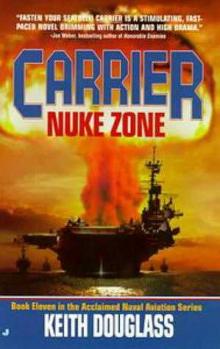 Nuke Zone c-11
Nuke Zone c-11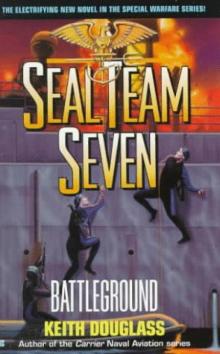 Seal Team Seven 6 - Battleground
Seal Team Seven 6 - Battleground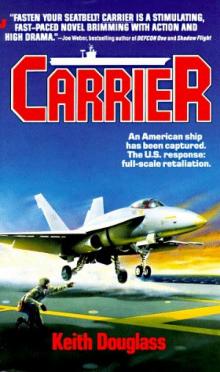 Carrier c-1
Carrier c-1 Island Warriors c-18
Island Warriors c-18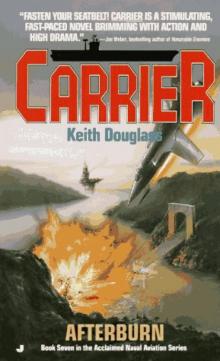 Afterburn c-7
Afterburn c-7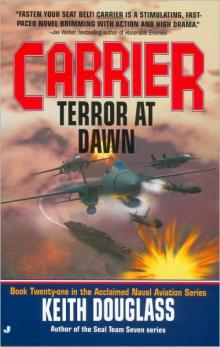 Terror At Dawn c-21
Terror At Dawn c-21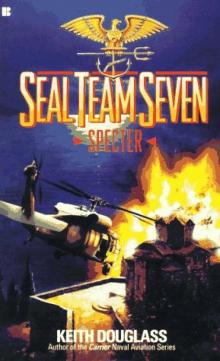 Specter sts-2
Specter sts-2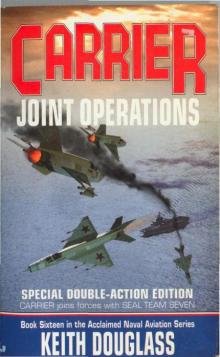 Joint Operations c-16
Joint Operations c-16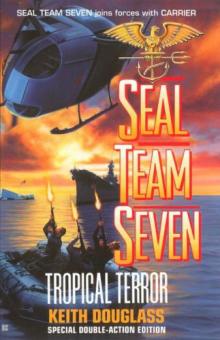 Tropical Terror sts-12
Tropical Terror sts-12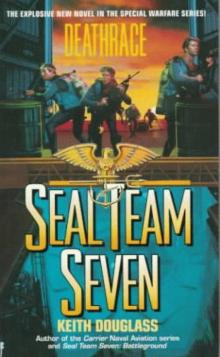 Seal Team Seven 7 - Deathrace
Seal Team Seven 7 - Deathrace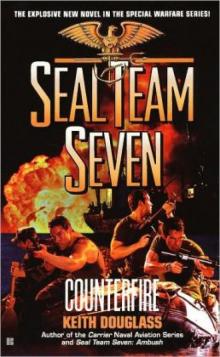 Counterfire sts-16
Counterfire sts-16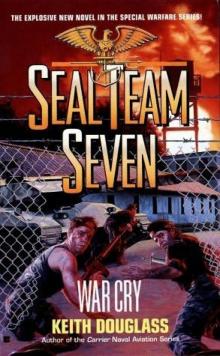 War Cry sts-9
War Cry sts-9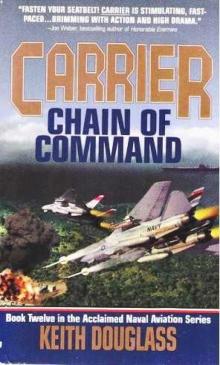 Chain of Command c-12
Chain of Command c-12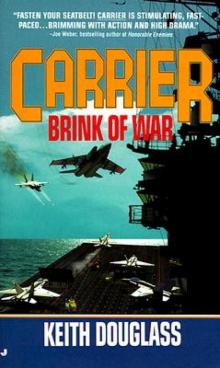 Brink of War c-13
Brink of War c-13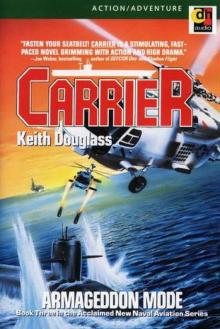 Armageddon Mode c-3
Armageddon Mode c-3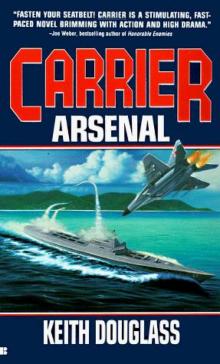 Arsenal c-10
Arsenal c-10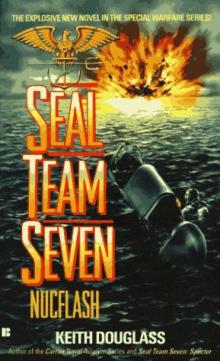 Nucflash sts-3
Nucflash sts-3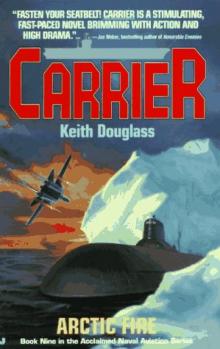 Arctic Fire c-9
Arctic Fire c-9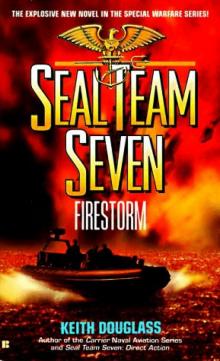 Firestorm sts-5
Firestorm sts-5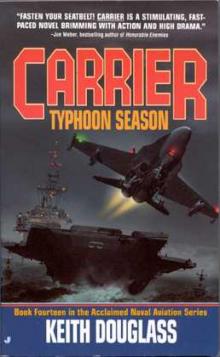 Typhoon Season c-14
Typhoon Season c-14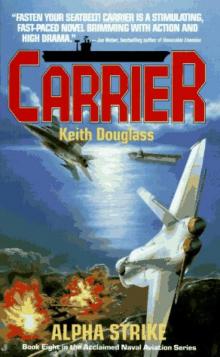 Alpha Strike c-8
Alpha Strike c-8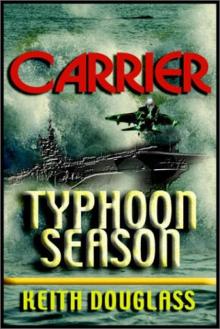 Carrier 14 - TYPHOON SEASON
Carrier 14 - TYPHOON SEASON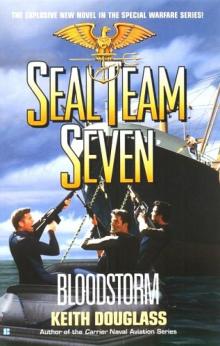 Bloodstorm sts-13
Bloodstorm sts-13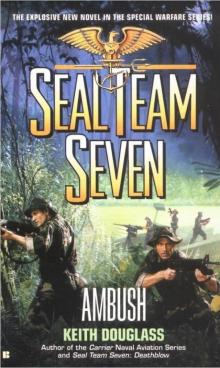 Ambush sts-15
Ambush sts-15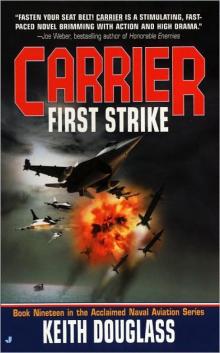 First Strike c-19
First Strike c-19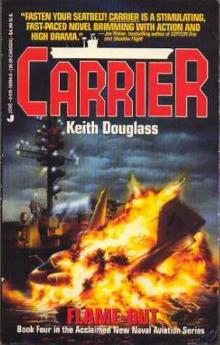 Flame Out c-4
Flame Out c-4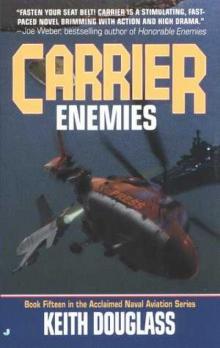 Enemies c-15
Enemies c-15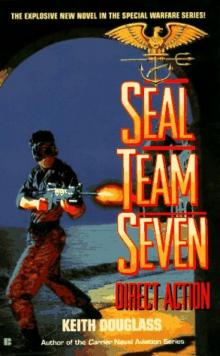 Seal Team Seven 04 - Direct Action
Seal Team Seven 04 - Direct Action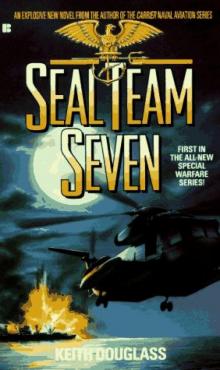 Seal Team Seven 01 - Seal Team Seven
Seal Team Seven 01 - Seal Team Seven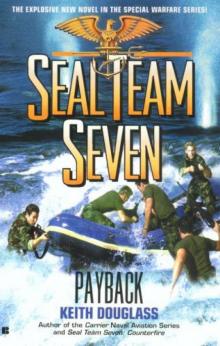 Payback sts-17
Payback sts-17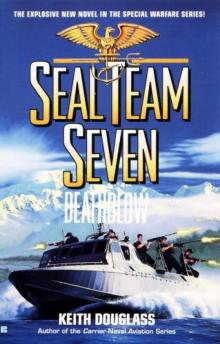 Death Blow sts-14
Death Blow sts-14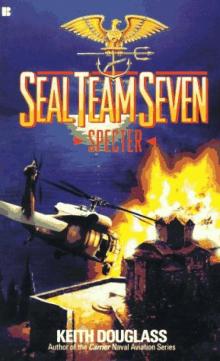 Seal Team Seven 02 - Spector
Seal Team Seven 02 - Spector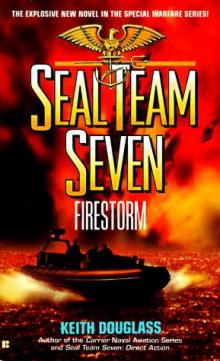 Seal Team Seven 5 - Firestorm
Seal Team Seven 5 - Firestorm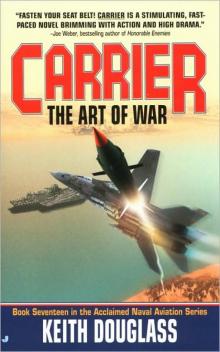 The Art of War c-17
The Art of War c-17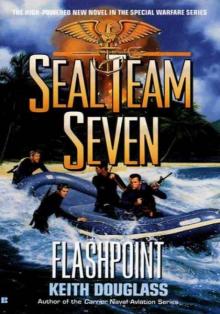 Flashpoint sts-11
Flashpoint sts-11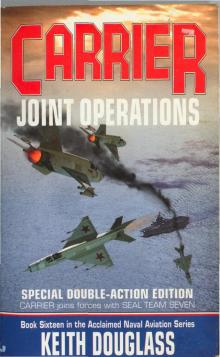 Carrier - Joint Operation Book 16
Carrier - Joint Operation Book 16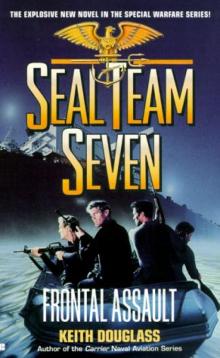 Frontal Assault sts-10
Frontal Assault sts-10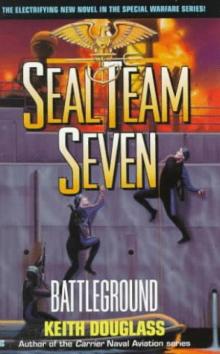 Battleground sts-6
Battleground sts-6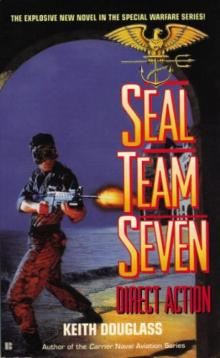 Direct Action sts-4
Direct Action sts-4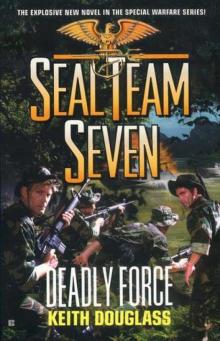 Deadly Force sts-18
Deadly Force sts-18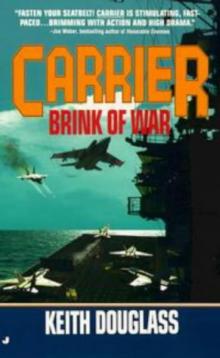 Carrier 13 - Brink of War
Carrier 13 - Brink of War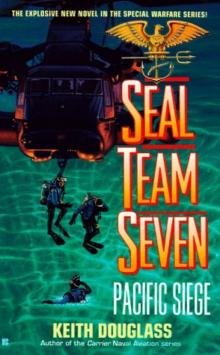 Pacific Siege sts-8
Pacific Siege sts-8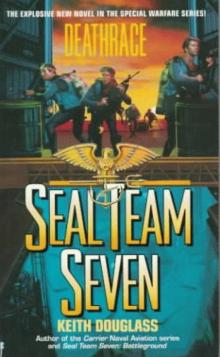 Deathrace sts-7
Deathrace sts-7